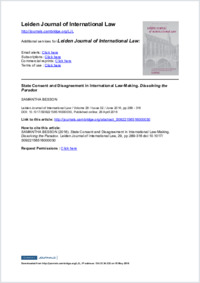State Consent and Disagreement in International Law-Making : Dissolving the Paradox
- Besson, Samantha University of Fribourg
-
2016
Published in:
- Leiden Journal of International Law. - 2016, vol. 29, no. 2, p. 289-316
English
This article starts with a paradox: international law-making is ridden with reasonable disagreement and yet no state can be bound by international law without its consent and hence without agreement. Breaking away from the pragmatic resignation that prevails among international law scholars on this question, the article proposes an interpretation of the role of state consent that both fits and justifies its central role in the practice of international law-making and, hopefully, strengthens the latter's legitimacy in the future. Its proposed justification actually lies in the circumstances of reasonable disagreement among democratic states and this proposal dissolves the paradox. The article argues that, in international law as it is the case domestically, consent is neither a criterion of validity of law nor a ground for its legitimate authority. It also dispels two myths about state consent: its necessary relationship to legal positivism and state sovereignty. Instead, the article argues, the role of democratic state consent is that of an exception to the legitimate authority of international law and hence to its bindingness in a concrete case. While the legitimacy of international law is not democratic, the democratic nature of states and their democratic accountability to their people matter. This is especially the case in circumstances of widespread and persistent reasonable disagreement as they prevail among democratic states in international law-making. In these circumstances, respecting the sovereign equality of democratic states by requiring their consent is the way to grant an equal voice to their people. Of course, there are limits to the democratic state exception that are inherent to both its democratic dimension (it requires respecting basic political equality) and its consensual dimension (it requires that consent is expressed in a free, fair and informed fashion). The article concludes by showing how the proposed disagreement-attuned account of democratic state consent explains various characteristics of the main international law-making processes, i.e., treaties and custom.
- Faculty
- Faculté de droit
- Department
- Département de droit international et droit commercial
- Language
-
- English
- Classification
- Law, jurisprudence
- License
- License undefined
- Identifiers
-
- RERO DOC 260819
- DOI 10.1017/S0922156516000030
- Persistent URL
- https://folia.unifr.ch/unifr/documents/304957
Statistics
Document views: 149
File downloads:
- BESSON_S._-_State_Consent_and_Disagreement.pdf: 347
